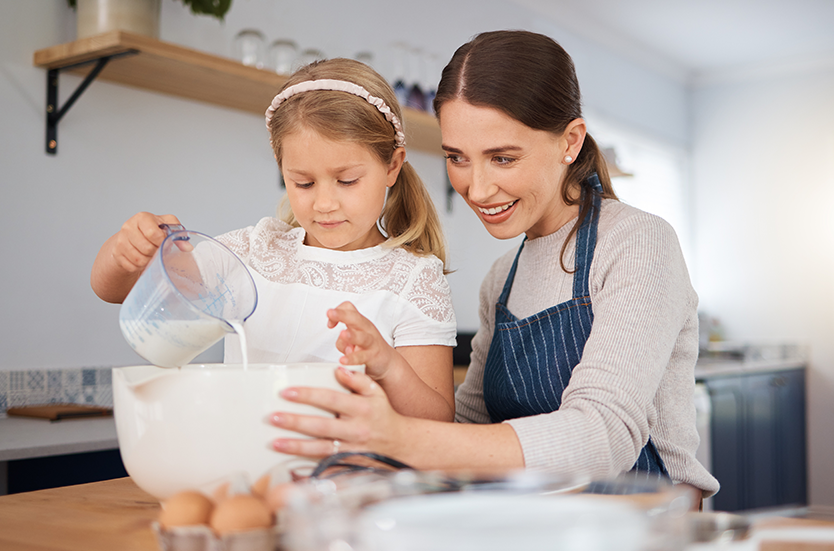Tips to get children involved in cooking and excited about food.
Teaching important life skills
Cooking as a family is a great way to get children excited about food. It helps them enjoy preparing and eating meals and snacks. Yes, it takes longer. Yes, there will be a mess. Yes, it’s easier to cook alone. But, it’s worth it!
Families who cook together are more likely to prepare balanced, home-cooked meals. It’s a chance to bond and enjoy each other’s company. It creates lasting memories, and it’s never too late to start!
Building cooking skills
Cooking is a chance for everyone to contribute and learn!
Assign tasks that are suitable for each child’s age and skill level. Download the Cooking technique illustrations from TeachNutrition.ca. This will help you teach basic cooking skills and proper handwashing.
Set kids up for success! Keep it fun with music, stories or a few jokes. Start with simple tasks to build confidence. Be sure to supervise cooking activities, especially with younger kids.
- Wash and dry lettuce. Tear leaves and add to a salad bowl.
- Decorate pizza with toppings and sprinkle with cheese. Try the No-bake mini pizza recipe from TeachNutrition.ca. Since this doesn’t require an oven, kids could make this as an after-school snack.
- Mix wet and dry ingredients when making muffins.
- Start with basic skills like dumping and mixing, then try skills like measuring and cutting.
- Cube cheese or cut soft fruit with a butter knife.
- Place paper liners in the muffin tin or coat with oil using a pastry brush.
- Try the Cinnamon two-bite muffins recipe from TeachNutrition.ca. These are bite-sized and perfect for small appetites.
- Crack eggs into a bowl and whisk for scrambled eggs.
- Add ingredients like fruit, yogurt and milk to a blender for a smoothie. Order a copy of the recipe brochure Spin-a-smoothie for new ideas.
- Mash avocado with a potato masher for guacamole.
- Layer yogurt, berries and oats to make a parfait. Watch the cooking video where kids make a Strawberry banana parfait.
- Use small spoons to measure out cookie dough.
- Spread butter on bread and add cheese to make a sandwich. Try the Apple cheddar grilled cheese or the Checkerboard cheese sandwich from TeachNutrition.ca.
Learning about foods
Take time to discuss ingredients used in cooking. Look at where the product comes from. Talk about buying Canadian foods to support local farmers and your community.
Think about how foods are grown or produced. Watch the Curious Cook videos from TeachNutrition.ca. These highlight dairy, strawberry u-pick and wheat farms.
Chat about foods or recipes you love. This could be everyday favourites or foods that remind you of someone special or a fun memory. Talking about food is a great way to share stories and keep family traditions going.
Consider making a collection of family recipes. Download the Family cookbook activity from TeachNutrition.ca. You could add your child’s favorite recipe each year and have this as a keepsake.
Enjoy food together as a family
One of the best parts of cooking is eating the food you prepared. When you cook as a family, children are more likely to eat food they helped to make.
Invite everyone to taste the food, without any pressure to like it or finish it.
Encourage open conversation like “would you make this recipe again?” or “what would you add or change next time?”.
Help children expand their vocabulary. Try describing foods using the five senses. Examples to get you started:
It looks .... bright, fluffy, long, smooth
It feels ... chewy, cold, juicy, soft, sticky
It sounds .... crunchy, fizzy, squeaky
It smells .... fruity, smokey, strong
It tastes ... bitter, garlicky, salty, sweet
Keep it Fresh
There are many ways to get new meal ideas. Join a cookbook club, browse your favourite recipe sites or ask friends for their go-to dishes. Try recipes from the Kids cooking club at TeachNutrition.ca. You may find a new family favourite!

